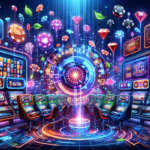Online gaming sites have evolved beyond mere entertainment platforms. Over the past few decades, they’ve transformed into vibrant virtual ecosystems that not only host games but also foster social interaction, collaboration, and even competition. The connection between players, developers, and communities has shaped the way online Hoki805 games are experienced and developed.
The Rise of Social Features in Gaming Platforms
Initially, online gaming was about the gameplay itself. Titles like Counter-Strike, Warcraft III, and Halo allowed players to compete against each other but had limited social features. It was often a simple one-on-one or team-based experience, where communication was restricted to basic voice chat or text.
However, with the advent of more sophisticated gaming engines and broadband internet, developers began integrating more advanced social features into online gaming platforms. Today, online gaming sites are complete ecosystems where players can form teams, share experiences, and even make lasting friendships.
Virtual Social Spaces: More than Just Games
Modern gaming sites have blurred the lines between gaming and social media. Platforms like Twitch, Discord, and Steam have emerged not only as game-launchers but as central hubs for social interaction. For instance, Discord, which started as a voice chat service for gamers, has now expanded into a full-fledged social platform where communities form around shared interests. Players can join “servers” dedicated to specific games, genres, or even unrelated hobbies, fostering rich discussions that go far beyond just gameplay.
Similarly, sites like Steam offer players a chance to build digital identities. They can curate collections of games, share screenshots and gameplay videos, join discussion groups, and even review games—all while maintaining a detailed online profile that serves as a reflection of their gaming persona. This has led to the creation of online communities that help shape a game’s culture and impact its success.
The Role of Esports and Competitive Play
Esports, or competitive gaming, has further emphasized the importance of community and social interaction in online gaming. High-level tournaments and leagues for games like League of Legends, Dota 2, and Overwatch have created entire industries centered around competition and fandom.
Gaming sites that host these tournaments, such as ESL, DreamHack, and MLG, have built massive followings. Fans engage not only with the game but with players, coaches, and analysts, becoming part of a broader cultural movement. Online forums and streaming services like YouTube and Twitch provide real-time commentary and direct communication between players and fans, enhancing the sense of connection.
Social Impacts of Online Gaming Communities
The social impacts of online gaming extend well beyond entertainment. For many, online games offer an avenue for socializing and emotional support. Gaming communities have proven to be valuable spaces for those who may feel isolated or marginalized in their offline lives. From competitive players working together to form professional teams to casual gamers forming lifelong friendships, online gaming platforms have provided a social fabric for millions.


